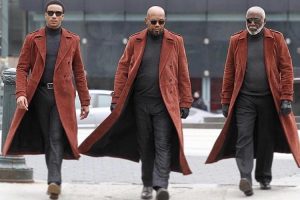
There have been five Shaft movies, three of them named simply “Shaft.” The latest isn’t a reboot, but a continuation of the John Singleton-directed version from 2000, which starred Samuel L. Jackson as the black private dick who’s a sex machine to all the chicks. Yes, I’m talking about John Shaft.
In the 2019 version, we learn that Shaft had a son with Maya (Regina Hall), and that John Jr. (Jessie T. Usher) grew up to be a data analyst for the FBI. When one of JJ’s friends dies under mysterious circumstances, he tries to find out what happened. For help, he goes to visit dad, and we’re off on a father-and-son adventure that will involve a drug lord, a Muslim mosque, and an old score from Senior’s day on the NYPD. But the plot is only designed to let the father make up for his deadbeat dad status by showing his son the ropes of going rogue and working outside the system — because Shaft don’t work for The Man — and to let Jackson be Jackson.
By this point in his career, Jackson is John Wayne, in that he’s essentially playing the same character in every movie. Regardless of his name, he’s brash, confident, wiser than everyone around him, incapable of being killed, and loud.
Ironically, the Shaft character, as portrayed by Richard Roundtree in the 1971 blaxploitation original, was a quiet man who let his actions speak for him. Roundtree made a cameo appearance in the 2000 version as Jackson’s uncle, but in this one, for some reason, he’s now Jackson’s father, with a deadbeat dad history of his own. It’s a little odd that Roundtree is 76 and Jackson is 70, but the former has a fully white beard while the latter has a dark Grecian Formula goatee, so okay, I’ll suspend disbelief and accept the altered Shaft family tree. It doesn’t matter any more than the plot does. Incidentally, Roundtree steals every scene he’s in by continuing to low-key his John Shaft.
The script, co-written and produced by “Black-ish” creator Kenya Barris, has a sense of humor and a few meta references, as when one character says Shaft looks like “that guy from The Matrix,” and Jackson takes him down because he’s sick of being confused with Laurence Fishburne (who, by the way, stars on “Black-ish”). There’s also a point where another character says, “They say this cat Shaft is a bad mother…” before being cut off by Regina Hall. There’s liberal use of the word “shaft” in a sexual connotation, too.
The soundtrack by Christopher Lennertz sounds contemporary but has sequences that are throwbacks to the Isaac Hayes score for the 1971 film, complete with infusions of flute. Of course, there’s an updated, hip-hop version of the Shaft theme played over the closing credits, but it can’t stand up to Hayes’ original, which remains in the pantheon of greatest movie themes ever.
As in any action movie, there are plenty of gunfights in which the heroes never miss but the bad guys always do. Any time you see a character in a fight in front of a window, you know they’re going through it. There are also two romantic subplots — one for Jackson, one for Usher — which are resolved exactly the way they always are in movies like this.
In the end, the whole thing is formulaic, an obvious attempt to set up a new series of Shaft sequels for a new generation. Unfortunately, Usher isn’t quite strong enough to carry it off, especially in Jackson’s shadow. As for the latter’s continuing participation, it’s not a matter of his age, it’s a matter of time. How could he fit another “Shaft” into his schedule, when he’s already making five or six movies a year?
If you just want to go along for the ride and leave logic aside — a standard disclaimer for this genre of action movie — you might enjoy the new “Shaft.” As for me, I’ll give it a 5 out of 10.
